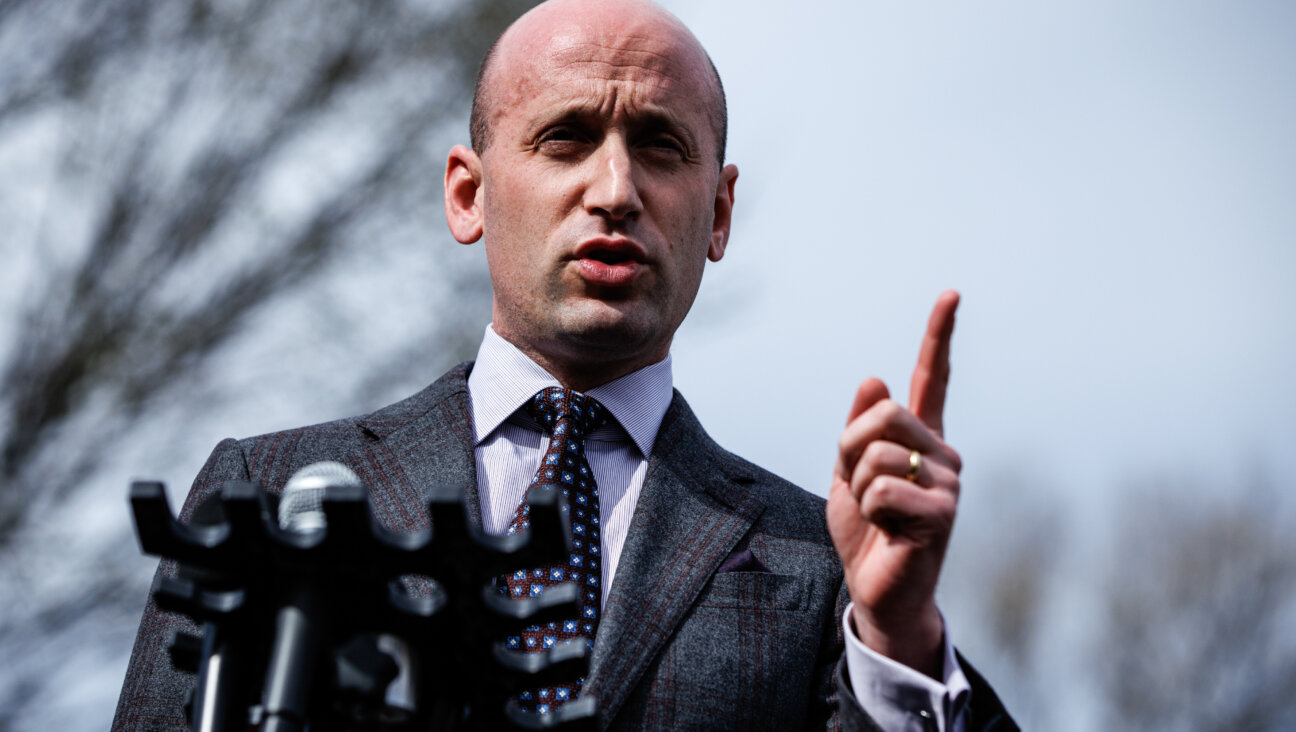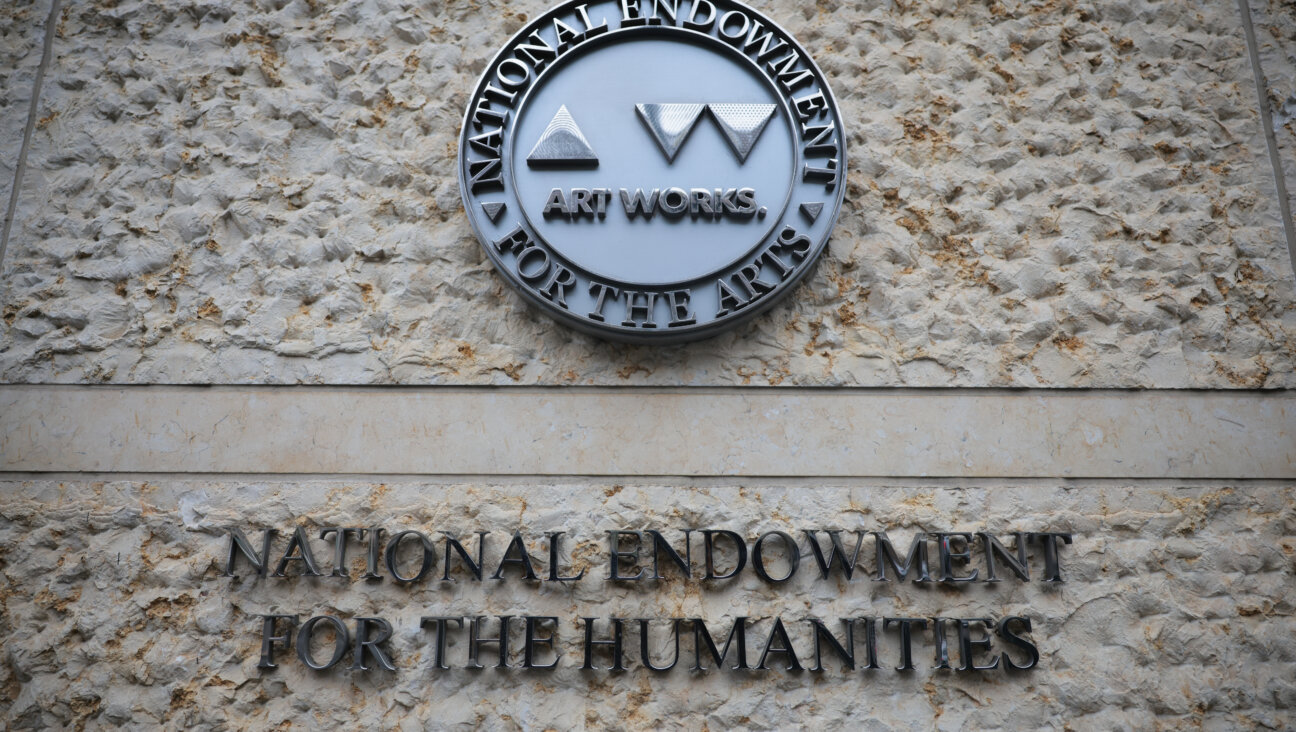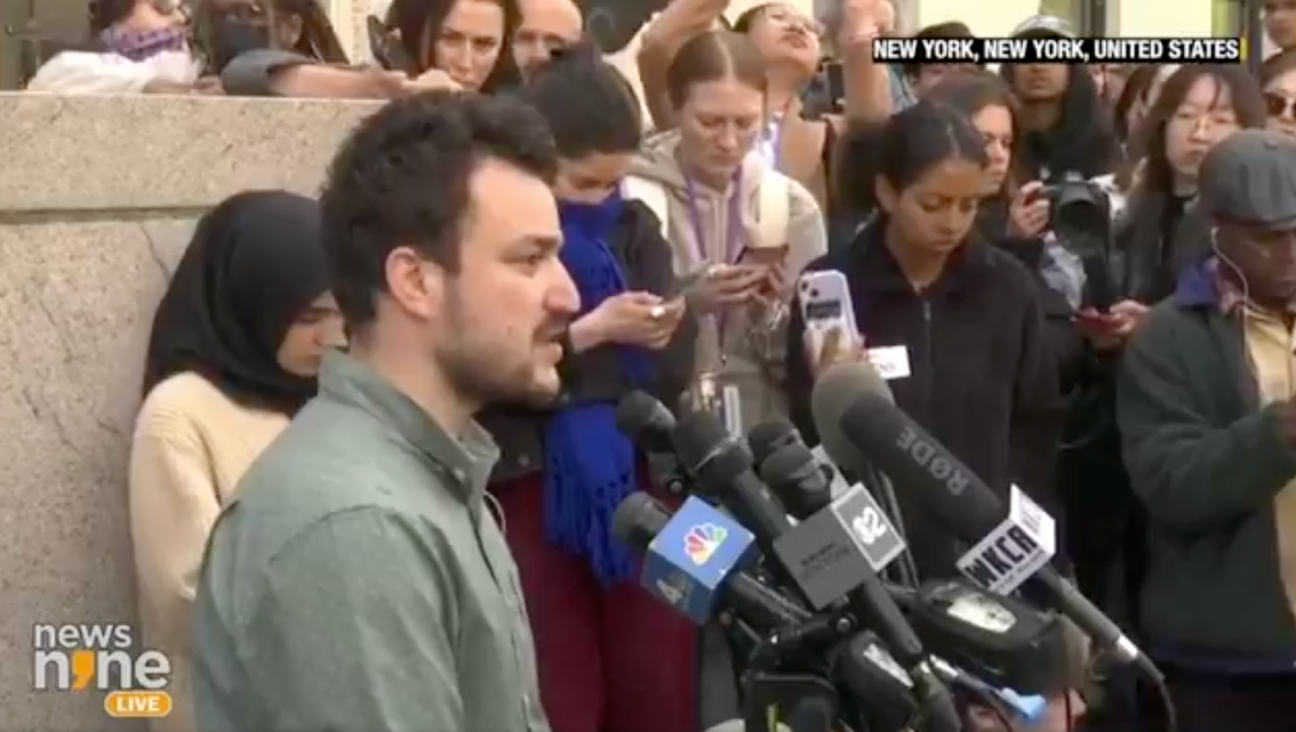Young Jews More Likely To Vote GOP Than Their Elders

GENERATION GAP: While Warren and Glenda Finn (top) and other older Jewish Americans have turned out for Barack Obama, the news for John McCain was better at a recent political debate at Yeshiva University.
Washington — Comedian Sarah Silverman has gotten a lot of mileage out of the notion that older Jewish voters, especially those in Florida, need to be persuaded to support Senator Barack Obama. Yet as it turns out, those bubbes and zaydes may be the ones prodding their grandchildren to support the Democratic nominee for president.

GENERATION GAP: While Warren and Glenda Finn (top) and other older Jewish Americans have turned out for Barack Obama, the news for John McCain was better at a recent political debate at Yeshiva University.
Contrary to the perception that young people are in the bag for Obama, polls indicate that younger Jewish voters are more likely than older Jews to support Republican Sen. John McCain for president. This surprising finding most recently turned up in an October 23 analysis by Gallup polls that showed growing support for Obama among all Jews, who for a long time had been cool to the Democratic nominee.
That survey, compiled from the monthly averages of Gallup’s daily tracking polls, including interviews with more than 500 Jewish registered voters each month, found that while 74% of Jews aged 55 and over were supporting Obama, only 67% of those under 35 said they’d vote for the Democratic nominee.
“It’s counter intuitive,” said Lydia Saad, Gallup’s senior editor.
But this finding does fit into other data showing that younger Jews are trending conservative politically. A study of the 2004 Jewish vote by the Solomon Project, an effort to record Jews’ civic involvement, found younger voters were slightly more likely than older Jews to support Republican George W. Bush over Democrat John Kerry. That analysis found 23% of voters under 30 voted for Bush, compared to 20% of those ages 45 to 60 and 17% among the 60-plus crowd.
This finding doesn’t come as much of a surprise to voters like Zach Hanover, a 19-year-old sophomore at The George Washington University who plans to vote for McCain when he casts his first ballot. Hanover, an Orthodox Jew reared in Memphis, where his father, a Democrat, would drag him to rallies with Bill Clinton and Al Gore, said his decision to be a Republican was an easy one.
“I just made a bullet list — abortion, taxes, spending, size of government — almost word for word it was the Republican platform,” said Hanover, adding that the traditional values he shares as an Orthodox Jew fit well with the values embraced by the GOP. “If you look at the biblical liturgy, the Judaic religion is about life.”
Much of the evidence pointing to Republican growth among younger Jews remains anecdotal but fits with the broader demographic trends that Hanover illustrates. Orthodox Jews represent the fastest growing segment of the Jewish community. They have more children, tend to be younger and more conservative politically than less observant Jews. Moreover, the Russian Jewish community, which also trends on the young side, is also overwhelmingly more politically conservative. Voters who are more religiously observant, regardless of denomination, tend to support more conservative political candidates.
“When you add that up, the two most Republican segments of the (Jewish) population are younger,” said Jonathan Sarna, a Brandeis University professor who has studied the Jewish vote.
These more conservative younger Jews are frequently more free-market oriented, less tied to the big government New Deal programs such as Social Security that older generations of Jews embrace, and more hawkish when it comes to national security and Israel.
That’s certainly the case for Michael Hershkop, a 20-year-old junior at Yeshiva University, who attended a debate there on Tuesday evening between College Republicans (very well represented) and College Democrats (a far smaller group). “To me, the two most important things are foreign policy and the economy. Right now I’m with McCain,” said Hershkop.
Within the younger demographic is another interesting trend: a gender gap. Jewish women of all ages voted more heavily for Kerry in 2004 than did Jewish men, and that gap was even more pronounced among younger voters. A full 88% of young Jewish women chose the Democratic candidate, compared to only 60% of young Jewish men.
“I know people feel that Obama isn’t good on Israel, but if you look at his voting record and everything he said, it only suggests a completely supportive attitude towards Israel, so I’m confident on that, and I think he can help the economy,” said Adina Pouko, 20, a junior from Milwaukee, who also attended the Y.U. debate.
And, she continued, “I think that there needs to be a very strong separation of church and state in this country, and I think that when you extend the Christian religion into this country, you get into scary territory. I don’t want the government intervening in any of that.”
But while younger Jews may favor McCain more than their older relatives, Jewish voters of all ages remain considerably more supportive of Obama compared to their non-Jewish peer groups.
Polling data provided to the Forward from Gallup’s daily tracking surveys showed that 67% of Jews ages 18 to 34 supported Obama compared to only 57.1% of their non-Jewish cohorts in polling from September 1 to October 21. Only 29% of Jews supported McCain, compared to 36.9% of non-Jews in that age group.
And with age, the difference between Jewish and non-Jewish voting patterns widens. The 10-point gap between Jews and non-Jews supporting Obama doubles among voters ages 35 to 54 (68.1% of Jews to 46.8% of non-Jews) and becomes a 30-point margin among older voters, with 74.2% of 55-plus Jews supporting Obama compared to only 44.5% of non-Jews.
With additional reporting by Lana Gersten in New York.
The Forward is free to read, but it isn’t free to produce

I hope you appreciated this article. Before you go, I’d like to ask you to please support the Forward.
Now more than ever, American Jews need independent news they can trust, with reporting driven by truth, not ideology. We serve you, not any ideological agenda.
At a time when other newsrooms are closing or cutting back, the Forward has removed its paywall and invested additional resources to report on the ground from Israel and around the U.S. on the impact of the war, rising antisemitism and polarized discourse.
This is a great time to support independent Jewish journalism you rely on. Make a Passover gift today!
— Rachel Fishman Feddersen, Publisher and CEO
Most Popular
- 1

Opinion My Jewish moms group ousted me because I work for J Street. Is this what communal life has come to?
- 2

Opinion Stephen Miller’s cavalier cruelty misses the whole point of Passover
- 3

Opinion Passover teaches us why Jews should stand with Mahmoud Khalil
- 4

Opinion Pro-Palestinian protests enriched Jewish life on my campus. Trump’s actions will do the opposite.
In Case You Missed It
-

Fast Forward Hours after Passover Seder, arsonist targets Gov. Josh Shapiro’s home
-

Culture Jews thought Trump wanted to fight antisemitism. Why did he cut all of their grants?
-

Opinion Trump’s followers see a savior, but Jewish historians know a false messiah when they see one
-

Fast Forward Trump administration can deport Mahmoud Khalil for undermining U.S. foreign policy on antisemitism, judge rules
-
Shop the Forward Store
100% of profits support our journalism
Republish This Story
Please read before republishing
We’re happy to make this story available to republish for free, unless it originated with JTA, Haaretz or another publication (as indicated on the article) and as long as you follow our guidelines.
You must comply with the following:
- Credit the Forward
- Retain our pixel
- Preserve our canonical link in Google search
- Add a noindex tag in Google search
See our full guidelines for more information, and this guide for detail about canonical URLs.
To republish, copy the HTML by clicking on the yellow button to the right; it includes our tracking pixel, all paragraph styles and hyperlinks, the author byline and credit to the Forward. It does not include images; to avoid copyright violations, you must add them manually, following our guidelines. Please email us at [email protected], subject line “republish,” with any questions or to let us know what stories you’re picking up.
















